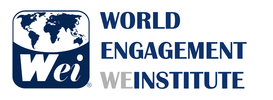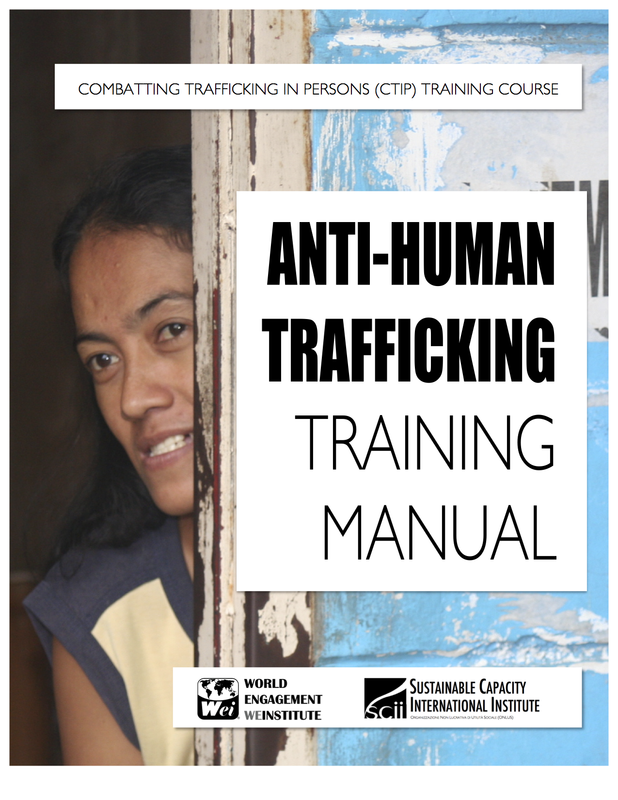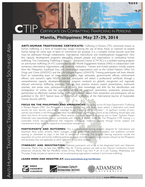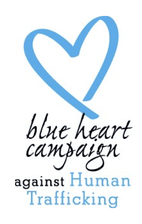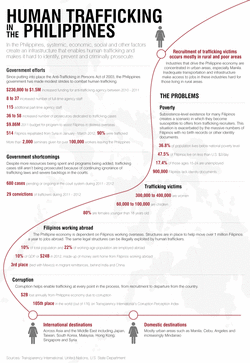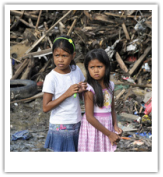Certificate on Combatting Trafficking in Persons (CTIP)
COMBATTING HUMAN TRAFFICKING IN SOUTHEAST ASIA
manila, Philippines: May 27, 28, 29, 2014
|
Password restricted to CTIP participants
|
Trafficking in Persons (TIP), commonly known as human trafficking, is a form of modern-day slavery involving the use of force, fraud, or coercion to exploit human beings for some type of labor or commercial sex purpose. It is a complex human security issue that must be addressed through collaborative, international, intercultural, and multidisciplinary engagement. Very few capacity development programs adequately prepare people and organizations in combatting human trafficking. The Combatting Trafficking in Persons (CTIP) is a certified training
program on anti-human trafficking (A-HT) coordinated by the World Engagement Institute (WEI) in collaboration with The
Sustainable Capacity International Institute (SCII-ONLUS), and Adamson University (ADU).
Trainers and invited speakers include experts from the Philippines, Southeast Asia, and international organizations such as the United Nations Office On Drugs and Crime (UNODC) and the UN Refugee Agency (UNHCR). Training participants will learn directly from an outstanding team of international experts, legal advocates, governmental officials, enforcement officers, and women's rights NGOs. Selected participants will obtain a professional certificate through a comprehensive capacity development training program centered on globally recognized and regionally relevant anti-human trafficking solutions. Through best practice analysis, expert presentations, teamwork activities, and onsite visits, participants will enhance their knowledge and skills for the identification and reintegration of victims and the promotion of the 4P approach (prevention, protection, prosecution, partnership) to effectively combat human trafficking. Selected papers from presenters and participants will be published in the 2014 Special Issue on Anti-Human Trafficking of the International Journal of Sustainable Human Security (IJSHS). |
ANTI-HUMAN TRAFFICKING (A-HT)
|
Human trafficking is a complex and multifaceted phenomena that requires multi-stakeholder coordinated responses. It is an multi-billion dollar illegal industry violating human rights through criminal or exploitative activities of vulnerable people, especially women and children, within a country or trans-nationally. There is a growing recognition that trafficking in people is not just a transnational crime and violation of human rights but also a crucial issue in social and economic development. Therefore, human trafficking is a human security issue. Combating human trafficking requires the expertise, resources and efforts of many individuals and entities, including government agencies, nongovernmental organizations, businesses, justice sector, and law enforcement. It requires partnerships among all of these entities to make a positive impact.
The United Nations (UN) Protocol to Prevent, Suppress and Punish Trafficking in Persons, Especially Women and Children, supplementing the United Nations Convention against Transnational Organized Crime (also known as the Palermo Protocol) was signed by all Member States in 2000 and entered into force in 2003. It offers practical help to prevent and combat trafficking in persons, protecting and assisting victims of trafficking and promoting cooperation. In 2009, UNODC, which is responsible for implementing the Protocol, launched the Blue Heart Campaign to support the implementation of the protocol while also raising awareness and engage multiple stakeholders into action. Human trafficking shall mean the recruitment, transportation, transfer, harbouring or receipt of persons, by means of the threat or use of force or other forms of coercion, of abduction, of fraud, of deception, of the abuse of power or of a position of vulnerability or of the giving or receiving of payments or benefits to achieve the consent of a person having control over another person, for the purposes of exploitation. Exploitation shall include, at a minimum, the exploitation of the prostitution of others or other forms of sexual exploitation, forced labour or services, slavery or practices similar to slavery or servitude or the removal of organs." (UN TIP Protocol, Article 3) The "4P" Paradigm – Prevention, Protection, Prosecution, and Partnership serves as a fundamental international framework to combat contemporary forms of slavery worldwide. The U.S. Department of State's Office to Monitor and Combat Trafficking in Persons employs diplomatic, economic, political, legal, and cultural tools to advance this paradigm worldwide. Secretary of State Hillary Rodham Clinton in 2009 introduced the "fourth P" – Partnership – in accordance to the United Nation's (UN) trafficking in persons protocol and the United States' Trafficking Victims Protection Act (TVPA).
"In recent years we've pursued a comprehensive approach reflected by the three Ps: prosecution, protection, and prevention. Well, it's time to add a fourth: partnership. The criminal network that enslaves millions of people crosses borders and spans continents. So our response must do the same. So we’re committed to building new partnerships with governments and NGOs around the world, because the repercussions of trafficking affect us all." – Hillary Rodham Clinton, Secretary of State Learn more about human trafficking issues and anti-human trafficking solutions HERE.
|
Trafficking in persons (TIP) in the Philippines
|
According to the Trafficking in Persons (TIP) 2013 Report by The US Department of State (DOS), the Philippines is a Tier 2 Country in its performance on combatting human trafficking. "The Government of the Philippines does not fully comply with the minimum standards for the elimination of trafficking; however, it is making significant efforts to do so." (TIP 2013: 301). The government sustained its levels of funding for the Inter-Agency Council Against Trafficking (IACAT), which is a key player in the coordinated fight against human trafficking in the Philippines and and affected Filipino migrant workers.
"The Philippines is a source country and, to a much lesser extent, a destination and transit country for men, women, and children subjected to sex trafficking and forced labor. A significant number of Filipino men and women who migrate abroad for work are subsequently subjected to conditions of involuntary servitude. Men, women, and children are subjected to conditions of forced labor in factories, at construction sites, on fishing vessels, on agricultural plantations, and in the shipping industry, as well as in domestic service and other service sector jobs in Asia and increasingly throughout the Middle East. A significant number of Filipina women working in domestic service in foreign countries also face rape, physical violence, and sexual abuse. Skilled Filipino migrant workers such as engineers and nurses are also subjected to conditions of forced labor abroad. Filipina women were subjected to sex trafficking in Malaysia, Singapore, Hong Kong, Republic of Korea, China, Japan, Saudi Arabia, United Arab Emirates, Qatar, Kuwait, and Syria. [...] Filipino migrant workers, both domestically and abroad, who became trafficking victims are often subjected to violence, threats, inhumane living conditions, nonpayment of salaries, confinement, and withholding of travel and identity documents. [...] Traffickers, at times in partnership with organized crime syndicates and corrupt government officials, recruit family and friends from villages and urban neighborhoods, sometimes masquerading as representatives of government-registered employment agencies. [...] Child sex tourism remained a serious problem in the Philippines, with sex tourists coming from Northeast Asia, Australia, New Zealand, Europe, and North America to engage in the commercial sexual exploitation of children. [...] Children in conflict-afflicted areas were particularly vulnerable to trafficking. (TIP 2013: 300). |
human trafficking in humanitarian emergencies
|
When natural disasters like Super Typhoon Haiyan (Yolanda) hit impoverished areas, human insecurity dramatically increases. In addition to suffering from hunger, dehydration, displacement and emotional stress, human trafficking spikes during natural disasters. Typhoon Haiyan (Yolanda) on November 8, 2013 affected over 16 million people with 4 million displaced. According to Bishop Broderick Pabillo, Convenor of the Philippines’ Interfaith Movement Against Human Trafficking and Manila’s Auxiliary Bishop, "out of the thousands of survivors relocated to Manila and Cebu, a yet unknown number of youngsters have been snatched by mafias to be sold to prostitution dens and modern slavemasters." (Devex). Disaster situations (like Haiyan) make poor people particularly vulnerable to exploitations, prostitution, child labor, forced labor, debt bondage, and other forms of human trafficking. Sustainable solutions to combat these human exploitations during humanitarian crises should focus on human support and diminishing vulnerability. To prevent an escalation of human trafficking during times of crisis, the Philippines and the international community should require an investment in capacity development programs to build awareness, reinforce the judicial system, provide opportunities to rehabilitation and protection of victims. Human trafficking, which is a common phenomenon in the Philippines, is exacerbated in times of humanitarian emergencies. Appropriate responses should be integrated into natural disaster responses including human trafficking prevention, protection, prosecution, and partnerships. The Philippines CTIP training is a sustainable human security response which integrates anti-human trafficking capacity through human support and improvement of our ability to respond to humanitarian emergencies.
|
PROGRAM AND ITINERARY
MAY 26: ARRIVAL. International participants arrive to the selected Pearl Hotel Manila (1122 General Luna Str., Corner Taft & United Nations Avenue, Ermita, Manila). Gathering in the Lobby on May 26th evening at 6:00 for a small introduction and reception with the training coordinator.
DAY 1: MAY 27 - TUESDAY: International participants will meet for breakfast in the Hotel and depart for the training hall at Adamson University. Ozanam Conference Center. 900 San Marcelino Street, Ermita, Manila City 1000, Metro Manila, Philippines. Each training day has three-four sessions from 9:00 am to 10:30; 11:00 to 12:30; 1:30 to 3:00; and 3:30 to 5:00 pm.
DAY 1: MAY 27 - TUESDAY: International participants will meet for breakfast in the Hotel and depart for the training hall at Adamson University. Ozanam Conference Center. 900 San Marcelino Street, Ermita, Manila City 1000, Metro Manila, Philippines. Each training day has three-four sessions from 9:00 am to 10:30; 11:00 to 12:30; 1:30 to 3:00; and 3:30 to 5:00 pm.
- SESSION 1: Welcoming ceremony and introduction of participants.
- SESSION 2: Understanding the dimensions or human trafficking internationally, in Southeast Asia and the Philippines
- SESSION 3: Identification of human trafficking cases and exploration of best practices from law enforcement
- SESSION 4: Prevention of human trafficking and best practices by civil society organizations.
- SESSION 5: Protection of victims of human trafficking. Exploration of best practices in the Philippines and worldwide.
- SESSION 6: Prosecution analysis of the legal systems in the Philippines along cases and practices of prosecution by the department of justice and the collaboration with NGOs.
- SESSION 7: Panel of experts representing multiple sectors and practices in anti-human trafficking (A-HT) in the Philippines. Open discussions and debates on the challenges and opportunities in combatting human trafficking in the Philippines and Southeast Asia.
- SESSION 8: Debriefing on the Panel of experts and activity for a plan of actions in small groups.
- SESSION 9: Reintegration of victims and best practice presentation of A-HT NGOs involved in the Philippines.
- SESSION 10: Each team of participants will share insights and observations for concrete call to actions and possible solutions to effective A-HT within their expertise, sector, organization and context.
- FINAL SESSION: Ceremony with the award of Certification on Combatting Human Trafficking (CTIP). Final remarks and concluding ceremony.
PARTICIPATION REQUIREMENTS
This
program is designed for young professionals, recent graduates, and advanced graduate
students with a strong interest in human trafficking, international human rights, women’s
rights,
international development or related fields. Required
qualifications include international travel
experience,
cross-cultural competence and
substantial working experience in a related field. She/he should be willing to
engage in international capacity building collaborative projects
addressing the needs
of the host country.
Successful
completion of the program requires pre-departure readings, cooperation and
teamwork.
learning outcomes
By the end of the program, participants will be able to:
- Identify the complex, interdisciplinary and international cases and effects behind the practice of human trafficking for sexual purposes and forced labor.
- Comprehend the international, regional and national criminal law and human rights implications in anti-human trafficking.
- Compare and integrate the human trafficking "4P" paradigm of protection, prevention, prosecution, and partnerships.
- Recognize and analyze the systemic, economic, educational, cultural, religious other elements in relation to human trafficking and human insecurity.
- Identify, collaborate and communicate feasible solutions to specific contextual issues in human trafficking.
PROGRAM FEES
The program fee is $650 USD and it includes the tuition cost for the certificate, training manual, access to online resources and the CTIP
certification document. Selected participants are invited to extend their stay with a site visit to A-HT organizations in Manila on Friday May 30. International participants should take advantage of their trip to the Philippines by extending their stay to the week end before or after the training.
APPLICATIONS
Qualified
candidates should submit a cover letter explaining their career interests in
relation to human trafficking, an updated bio (this should be no longer than a page, include your contact information and recent photo). The registration deadline is April 15, 2014 at Midnight CST.
CUSTOM PROGRAMS
Our team of experts in anti-human trafficking training can offer other culturally adapted certificates and trainings in the context of Southeast Asia. Please contact us for a customized training for your organization or region. Although the Philippines and Southeast Asia are the focus area of these training programs, our team of experts have prepared other similar programs for Vietnam and will offer future certified trainings for the Balkans. Please contact us if interested in participating in future programs. If your organization or university is interested in exploring a possible training customized to your geographical or sector needs, please contact us at [email protected]
